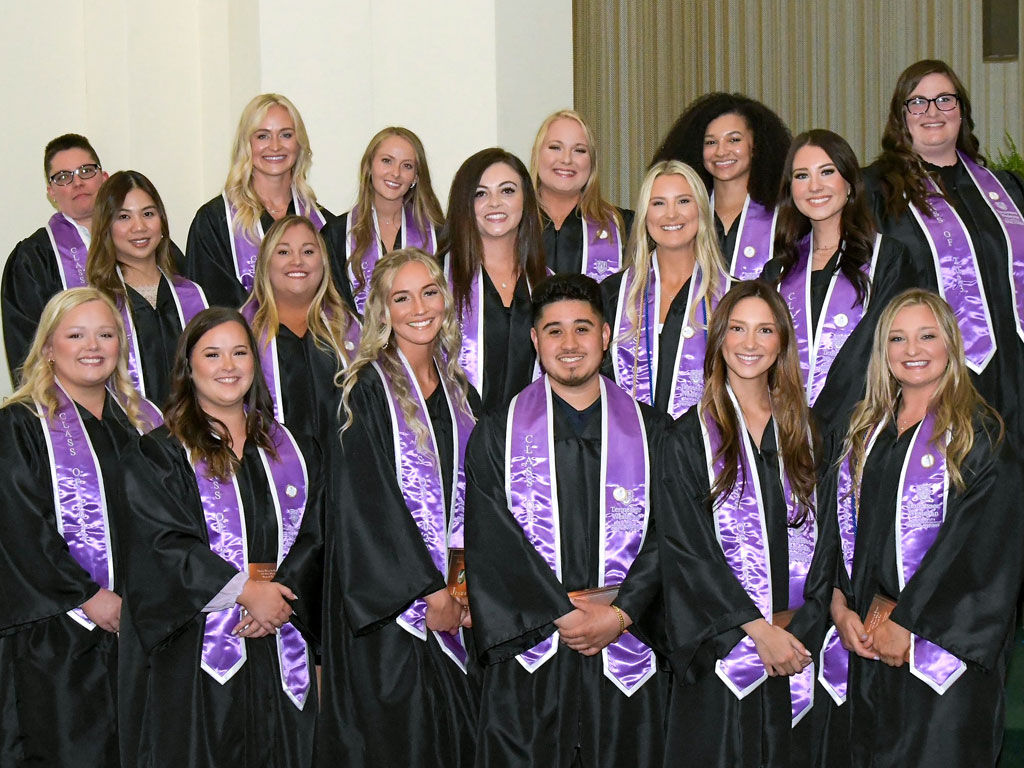Dental Hygiene
November 25, 2023 2024-04-26 14:14Dental Hygiene







Program Description
The TWU program prepares graduates for entry level positions as dental hygienists. Students train to put theory into practice in a clinical setting.
The first two years focus on pre-professional general education. The final two years focus on the dental hygiene curriculum. The full-time only program begins in a student’s junior year. The application process is open from November-March of the sophomore year. Students must have a 2.5 GPA in their prerequisite coursework. Students who complete their general educational core at Tennessee Wesleyan receive priority.
Career Opportunities
Graduates with a bachelor’s in Dental Hygiene have multiple opportunities to advance their career or pursue further academic training.
Practice Dental Hygiene
The TWU program will you prepare you to take the National Board Dental Hygiene Examination, the state or regional board, and apply for licensure in the state you plan to practice.
Earn a Master’s in Dental Hygiene
Want to continue on to graduate school? Great! A bachelor’s degree in Dental Hygiene can help you qualify for master’s programs which will provide opportunities for leadership, teaching and more.
Go to Dental School
Decide you want to move on to be a dentist? Terrific! The TWU Dental Hygiene program will prepare you to apply to dental school. Think of it as a pre-professional degree with job options right away!
Apply To The Program
Submit the following documents to Admissions:
•Official college transcripts (including Dual Enrollment)
•Official high school transcript (if you went to high school in the state of Tennessee)
•2 letters of reference (one professional, one academic)
•Documentation of 16 observation hours of a dental hygienist completed within the past 6 months
•Completion of all prerequisite courses
•Minimum GPA of 2.5 (3.0 is considered competitive)
•Successful interview with the dental hygiene department
Applicant Selection
The top 30 applicants will be selected to interview. Admission will be granted to the top 24 applicants following a successful interview.
Mission Statement
The mission of the TWU Department of Dental Hygiene is to create an environment where clinically exceptional dental hygienists who are knowledgeable, confident, conscientious, compassionate, ethical, professional in appearance and behavior, and active within the professional community are born. We strive to foster a sense of pride, integrity, curiosity, and benevolence in all students by providing experiences that are consistent with these goals. Through the unified efforts of the entire dental hygiene department, we guide our students to become future leaders within the dental community.
Core Competencies
The dental hygiene program mission will be accomplished through the dedication and collaboration of the quality faculty, administration and staff in an encouraging and nurturing environment that emphasizes the core competencies:
1. The dental hygiene graduate will be competent in applying ethical, legal and regulatory concepts in the provision and/or support of oral health care services.
2. The dental hygiene graduate will be competent in critical thinking and problem solving related to comprehensive care and management of patients.
3. The dental hygiene graduate will be competent in interpersonal and communication skills to effectively interact with diverse population groups.
4. The dental hygiene graduate will be competent in assessing, planning, implementing and evaluating community based oral health programs including health promotion and disease prevention activities.
5. The dental hygiene graduate will be competent in providing oral health care to individuals at all stages of life and for all periodontal classifications.
6. The dental hygiene graduate will demonstrate competent knowledge and self-assessment skills necessary for life-long learning.
Dental Hygiene Clinic
Located alongside the dental hygiene academic workspace is our dental clinic. The newly renovated space on the TWU Athens campus provides the opportunity for students to learn through hands-on experience by serving members of the Tennessee Wesleyan and Athens communities.
Clinic Fast Facts:
•The dental hygiene facility is a newly updated and includes the clinic, lab and classroom
•The clinic contains 10 operatories and is equipped with chairside computers, intraoral cameras and digital radiography
•DH students treat patients of all ages from the community in the clinic
•TWU’s Mobile Dental Unit (MDU) allows students the opportunity to offer patient care at numerous locations including health fairs, schools and senior centers
•DH Community Health courses engage students with the community through projects and events that bring dental education and awareness to diverse populations
1. The dental hygiene graduate will be competent in applying ethical, legal and regulatory concepts in the provision and/or support of oral health care services.
2. The dental hygiene graduate will be competent in critical thinking and problem solving related to comprehensive care and management of patients.
3. The dental hygiene graduate will be competent in interpersonal and communication skills to effectively interact with diverse population groups.
4. The dental hygiene graduate will be competent in assessing, planning, implementing and evaluating community based oral health programs including health promotion and disease prevention activities.
5. The dental hygiene graduate will be competent in providing oral health care to individuals at all stages of life and for all periodontal classifications.
6. The dental hygiene graduate will demonstrate competent knowledge and self-assessment skills necessary for life-long learning.
Clinic Hours & Info
306 N White St
Athens, TN 37303
(NW corner of College St and White St)
Call for appointment: (423) 252-1475
Clinic Days/Hours:
Fall semester: Monday, Wednesday, Friday- 8:00-5:00
Spring semester: Monday through Friday- 8:00-5:00
Summer session: Tuesday and Thursday- 8:00-5:00
•Students provide services to all ages from children to adults.
•Patients are scheduled at either 8:00 or 1:00 for appointments. Because this is an educational facility, apointments may be up to 3 hours in length and patients may require more than one appointment to complete treatment.
•Please provide at least 24 hours notice for a cancellation.
•Students are penalized for loss of production due to broken appointments, so please be courteous and give proper notice in order for the student to secure another patient.
•A dentist is on site to provide examinations and referrals, if necessary.
Accreditation
The TWU Dental Hygiene Program holds full accreditation status from the Commission on Dental Accreditation of the American Dental Association.
The Commission on Dental Accreditation can be contacted at (312) 440-4653 or at 211 East Chicago Avenue, Chicago, IL 60611.
Dental Hygiene Career Information
What is a Dental Hygienist?
Registered Dental Hygienists provide dental health education, prevent and treat oral disease, promote and encourage the preventive aspects of dental care, and assume responsibility for patient care in the dental office. They are graduates of dental hygiene education programs in community colleges, colleges, and universities. They are required to take written and clinical examinations before they are allowed to practice. Besides working in a private dental practice, dental hygienists also work as educators, administrators, researchers and entrepreneurs.
Job Description (American Dental Association, 2018)
A career as a dental hygienist offers a wide range of challenges. In the dental office, the dentist and the dental hygienist work together to meet the oral health needs of patients. Since each state has its own specific regulations regarding their responsibilities, the range of services performed by hygienists varies from state to state. Some of the services provided by dental hygienists may include:
- patient screening procedures; such as assessment of oral health conditions, review of the health history, oral cancer screening, head and neck inspection, dental charting and taking blood pressure and pulse
- taking and developing dental radiographs (x-rays)
- removing calculus and plaque (hard and soft deposits) from all surfaces of the teeth
- applying preventive materials to the teeth (e.g., sealants and fluorides)
- teaching patients appropriate oral hygiene strategies to maintain oral health;
(e.g., tooth brushing, flossing and nutritional counseling) - counseling patients about good nutrition and its impact on oral health
- making impressions of patients’ teeth for study casts (models of teeth used by dentists to evaluate patient treatment needs)
- performing documentation and office management activities
Career Advantages (American Dental Association, 2018)
Dental hygiene offers the following challenges and rewards:
Personal satisfaction: One of the most enjoyable aspects of a career in dental hygiene is working with people. Personal fulfillment comes from providing a valuable health care service while establishing trusting relationships with patients.
Prestige: As a result of their education and clinical training in a highly skilled discipline, dental hygienists are respected as valued members of the oral health care team.
Variety: Dental hygienists use a variety of interpersonal and clinical skills to meet the oral health needs of many different patients each day. Hygienists have opportunities to help special population groups such as children, the elderly and the disabled. They may also provide oral health instruction in primary and secondary schools and other settings.
Creativity: Because dental hygienists interact with such diverse population groups, they must be creative in their approach to patient management and oral health education.
Flexibility: The flexibility offered by full- and part-time employment options and availability of evening and weekend hours enable dental hygienists to balance their career and lifestyle needs. Hygienists also have opportunities to work in a wide variety of settings including private dental practices, educational and community institutions, research teams and dental corporations.
Security: The services that dental hygienists provide are needed and valued by a large percentage of the population. There is currently a great demand for dental hygienists. Employment opportunities will be excellent well into the future. Due to the success of preventive dentistry in reducing the incidence of oral disease, the expanding older population will retain their teeth longer, and will be even more aware of the importance of regular dental care. With the emphasis on preventive care, dentists will need to employ more dental hygienists than ever before to meet the increased demand for dental services.
Opportunities (American Dental Association, 2018)
Hygienists are in demand in general dental practices and in specialty practices such as periodontics or pediatric dentistry. They also may be employed to provide dental hygiene services for patients in hospitals, nursing homes and public health clinics.
Depending upon the level of education and experience achieved, dental hygienists can apply their skills and knowledge to other career activities such as teaching hygiene students in dental schools and dental hygiene education programs. Research, office management and business administration are other career options. Employment opportunities also may be available with companies that market dental-related materials and equipment.
Dental Hygiene Program Technical Standards
The following standards pertain to the particular cognitive, motor, behavioral, and social skills that are associated with the educational process of the Dental Hygiene Program.
Skills:
- Active Listening – Giving full attention to what other people are saying, taking time to understand the points being made, asking questions as appropriate, and not interrupting at inappropriate times.
- Speaking – Talking to others to convey information effectively.
- Reading Comprehension – Understanding written sentences and paragraphs in work related documents.
- Active Learning/Critical Thinking – Understanding the implications of new information for both current and future problem-solving and decision-making.
- Time Management – Managing one’s own time and the time of others.
Abilities:
- Oral Comprehension – The ability to listen to and understand information and ideas presented through spoken words and sentences.
- Oral Expression – The ability to communicate information and ideas in speaking so others will understand.
- Problem Sensitivity – The ability to tell when something is wrong or is likely to go wrong. It does not involve solving the problem, only recognizing there is a problem.
- Finger Dexterity – The ability to make precisely coordinated movements of the fingers of one or both hands to grasp, manipulate, or assemble very small objects.
- Near Vision – The ability to see details at close range (within a few feet of the observer).
Tasks and Activities:
Occupation specific tasks and the most important generalized work activities for Dental Hygienist
Occupation Specific Tasks:
- Administer local anesthetic agents.
- Apply fluorides and other cavity preventing agents to arrest dental decay.
- Chart conditions of decay and disease for diagnosis and treatment by dentist.
- Clean calcareous deposits, accretions, and stains from teeth and beneath margins of gums, using dental instruments.
- Conduct dental health clinics for community groups to augment services of dentist.
- Examine gums, using probes, to locate periodontal recessed gums and signs of gum disease.
- Expose and develop x-ray film.
- Feel and visually examine gums for sores and signs of disease.
- Feel lymph nodes under patient’s chin to detect swelling or tenderness that could indicate presence of oral cancer.
- Maintain dental equipment and sharpen and sterilize dental instruments.
- Maintain patient recall system.
- Make impressions for study casts.
- Place and remove rubber dams, matrices, and temporary restorations.
- Provide clinical services and health education to improve and maintain the oral health of patients and the general public.
- Record and review patient medical histories.
- Remove excess cement from coronal surfaces of teeth.
- Remove sutures and dressings.
Generalized Work Activities:
- Documenting/Recording Information – Entering, transcribing, recording, storing, or maintaining information in written or electronic/magnetic form.
- Performing for or Working Directly with the Public – Performing for people or dealing directly with the public. This includes serving customers in restaurants and stores, and receiving clients or guests.
- Assisting and Caring for Others – Providing personal assistance, medical attention, emotional support, or other personal care to others such as coworkers, customers, or patients.
- Getting Information – Observing, receiving, and otherwise obtaining information from all relevant sources.
- Communicating with Supervisors, Peers, or Subordinates – Providing information to supervisors, co-workers, and subordinates by telephone, in written form, e-mail, or in person.
Detailed Work Activities:
- administer anesthetics
- administer injections
- administer medications or treatments
- analyze dental data
- analyze medical data
- collect clinical data
- collect dental laboratory diagnostic data
- communicate technical information
- follow clinical radiation safety procedures
- follow dental or medical office procedures
- follow dental or medical x-ray procedures
- follow infectious materials procedures
- follow patient observation procedures
- identify body response variations
- inventory medical supplies or instruments
- maintain dental or medical records
- make presentations on health or medical issues
- observe patient condition
- operate dental equipment
- perform dental hygiene procedures
- prepare patient for dental work
- record medical history or data
- set up dental equipment
- understand technical operating, service or repair manuals
- use clinical sterilizing technique
- use darkroom procedures in radiology or medical or dental lab setting
- use dental treatment procedures
- use emergency medical procedures
- use hazardous materials information
- use interpersonal communication techniques
- use knowledge of dental terminology
- use knowledge of medical terminology
- use quality assurance techniques
- use sanitation practices in health care settings
- work with persons with mental disabilities or illnesses
Tools and Technology
- Dental lasers – Caries detection aids, Dental lasers, Neodymium-doped Yttrium Aluminum Garnet Nd:YAG dental lasers
- Dental probes – Calculus explorers, Caries explorers, Nabers furcation probes, Periodontal probes
- Dental scalers or accessories – Autoscalers, Cavitron equipment, Dental curettes, Hand scalers, Hollow handle scalers
- Dental x ray units – Dental x ray machines, Digital dental x ray units, Panoramic dental x ray units, Portable dental x ray units
- Teeth cleaning devices or accessories – Air-driven dental polishers, Air/water syringes, Dental polishers, Motor-driven dental polishers
Technology:
- Accounting software – Dental billing software
- Calendar and scheduling software – Scheduling software
- Electronic mail software – Email software
- Inventory management software – Inventory management software
- Medical software – Dental charting software, Dental clinical records software, Dental digital radiology software, Dental imaging software, Dental intra-oral imaging software
Blood Borne Pathogen Statement
All applicants must be aware that the activities required for both the TWU Dental Hygiene Program and the profession of dental hygiene, require the student/professional to participate in procedures that place the clinician at risk for blood borne pathogens.











